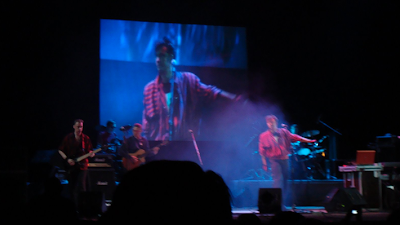The most necessary bands to come back out from Leningrad, other than Akvarium, were: Kino, lead by charismatic Viktor Tsoy; Alisa, an aggressive new wave band with tendencies towards heavy metal and a sound with intense drive; Televizor (Television), created in 1984 by keyboard player and vocalist Mikhail Borzykin; and Strannye Igry (Strange Games), one in all the foremost original and creatively daring Leningrad bands of early Eighties.
 |
| Viktor Tsoy (Kino) |
Kino was shaped in 1984, and immediately became a cult band. It had been known for its cool new wave sound, detached performance and melancholy lyrics praising youthful bohemianism. Kino came to an finish with Tsoy’s untimely death in 1990.
 |
| Alisa |
Alisa was shaped by its bass player, Slava Zadirii, in 1983. It catapulted to fame within the Soviet Union thanks to the talent of its lead singer and song author Konstantin Kinchev, known for his ritualistic conceptualist comes and magnetic stage presence.
 |
| Televizor |
Televizor was known for its new wave sound and high level of social criticism. Mikhal Borzykin is credited for single-handedly abolishing the system of ideological censorship in line with which each and every Soviet band was needed to submit its lyrics to a panel of censors for approval. Throughout the fourth festival of the Leningrad Rock Club in 1976, Barzykin refused to submit his lyrics to censors. Remarkably, this action led to no negative consequences for the band. After this, the complete establishment of rock censorship collapsed. This incidence had a sway reaching way beyond the rock scene, and led to an additional weakening of the ability of the Soviet cultural watch dogs.
 |
| Strannye Igry |
Formed in 1982, Strannye Igry incorporated into its music parts of ska, an ironic stage show and philosophical lyrics from translated French poets. This was uncommon for Soviet rock. Strannye Igry broke up in 1985, giving birth to 2 different necessary Leningrad bands: Igry (Games), that generally continued the experimental direction of Strannye Igry, and AVIA, famous for its futurist-inspired tongue-in-cheek shows that satirized Socialist kitsch. In its music this band used parts from a spread of traditions: jazz, military marches, tango and rock.
 |
| Sergei Kurekhin - Poluliarnaia Mekhanika |
Another highly experimental, daring and influential band was Sergei Kurekhin’s Poluliarnaia Mekhanika (Popular Mechanics). instead of a band, it had been a conceptual project, with a awfully sturdy penchant for absurdity and satire. Pianist, composer and producer Kurekhin, was creator of Populiarnaia Mekhanika, was its solely permanent member and driving force. Populiarnaia Mekhanika was known to incorporate on stage several musicians, to utilize army choruses and official Soviet pop stars who were unsuspecting of pranks. Its stage show was absurd, funny and provocative, and its music was a pastiche of music designs and genres, blended by classically trained Kurekhin into a tapestry of refined nonsense. Kurekhin additionally worked as a keyboard player with Akvarium and, later, till his untimely death in 1996, developed within the West an acclaimed career as a new age composer and keyboard player. An artist with a large vary of abilities and interests, Kurekhin was called a cultural provocateur, an extremist not solely in his art however additionally in his political affairs. one in all his last post-Soviet antics was his open support of the extremist neo-right National Bolshevik party. Kurekhin was additionally an acclaimed jazz musician and film actor.
 |
| Michail Naumenko |
One of the brightest stars of the first Eighties single-handedly chargeable for the rock music education of generations of young Russian rock musicians after him was Michail (Mike) Naumenko, who came to prominence within the Leningrad rock scene around 1978 with Boris Grenenshchikov. In 1980, Naumenko created his legendary band Zoopark (Zoo), that left a long-lasting imprint on the following development of rock within the Soviet Union. Within the Eighties, several young musicians, notably within the provinces, were already learning to play, not by using Western examples as was the case through the Nineteen Sixties and Nineteen Seventies, instead they using songs recorded by Naumenko throughout his solo career or his career with Zoopark.
His appeal, primarily based upon extraordinary sincerity, simplicity and therefore the timeliness of his songs, was monumental. No musician before Naumenko managed to attain such a high degree of accessibility, intimacy and honesty. He managed to re-create in his songs the foremost placing and realistic pictures of the great and unhealthy sides of Soviet life. He died in August 1991 at just before the Soviet era finished, the bard of that he had become.
(... to be continued)